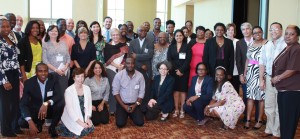
Last week government and civil society representatives from eight Caribbean countries finalised country-specific strategies to strengthen their HIV programmes by making them more responsive to human rights.
During a three-day workshop hosted by the Joint United Nations Programme on HIV/AIDS (UNAIDS) and supported by the Ford Foundation, country representatives discussed cultural, social and political barriers to eliminating stigma and discrimination and increasing access to social justice.
In the Caribbean, the HIV response has experienced remarkable progress. However, inequality and exclusion are hampering efforts to reduce new HIV infections and to increase the number of people on treatment. Stigma and discrimination towards people living with HIV and key populations such as sexually active young people, men who have sex with men, transgendered people, sex workers, people who use drugs, homeless people and prisoners, remain a major obstacle to expanding access to HIV services. It also hinders people’s ability to live full and productive lives of dignity.
UNAIDS Caribbean Regional Support Team Director, Dr Ernest Massiah, said that the investments made in securing social justice in the context of HIV would positively impact other areas of Caribbean life.
Participants from Barbados, The Dominican Republic, Guyana, Haiti, Jamaica, St Lucia, Suriname and Trinidad and Tobago explored practical ways to integrate human rights into their HIV responses. They developed detailed plans to address a range of country-specific issues, including workplace discrimination, gender-based violence, discriminatory laws and prejudice in the healthcare, social security, law enforcement and judicial systems.
UNAIDS Human Rights and Law Division Chief Susan Timberlake, explained that UNAIDS, other United Nations agencies and some global partners will support the countries to implement their national human rights and gender equality action plans.



